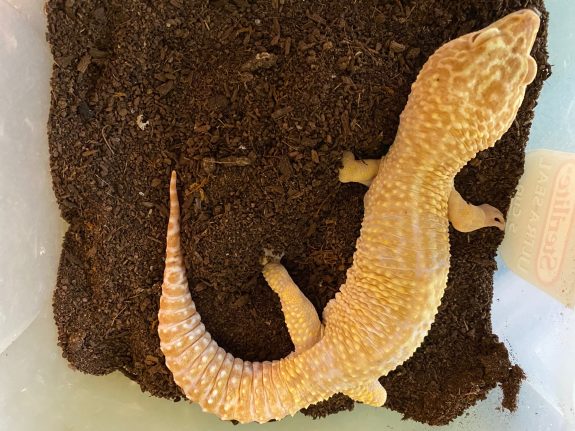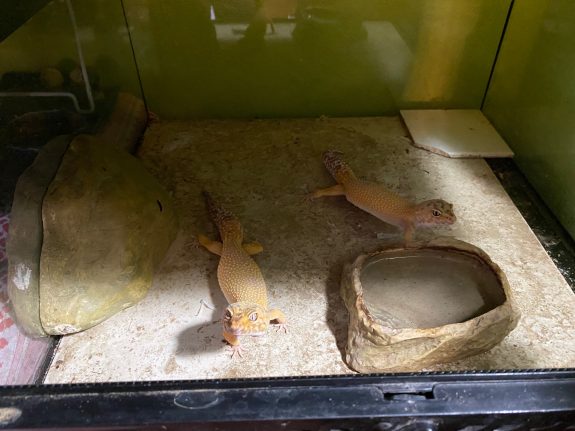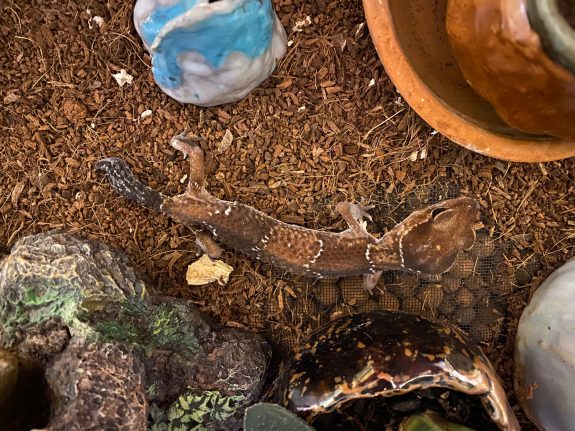The unprecedented changes in our lifestyles and daily rhythms due to COVID-19 cause me to reflect on my own 3-year experience living with contagion, infection and death —Cryptosporidiosis. There are many differences: “crypto” is not a virus, it’s not fatal to humans and the contagion in my home has been at 100% since 2017. Even so, the actions we have all been advised to take, the concern about contamination via doorknobs or other objects, all remind me of what I didn’t do years ago as I continue to cope with the consequences.
Prevention
I should have known better. In 2011, Gecko Time published an article called Biosecurity for the Gecko Breeder. It seemed a bit much for me to do back then and I’m now paying the price. As we know with the washing and social distancing we’re needing to do these days, there is no way to be 100% safe. While most of us are careful to wash our hands and minimize contact, we differ in how far we want to go: 6 feet of distance or further? Masks or no masks? Should we enter a grocery store or not? It’s the same with crypto. The safest thing may be to own only 1 gecko. Barring that, here are some other recommended steps, which I included in my original article, for minimizing the chance that your collection will end up like mine:
- In addition to quarantining new geckos, have each new gecko tested for crypto at the beginning and again at the end of the quarantine period. Geckos can be tested by swabbing the vent; a fecal sample isn’t necessary. Repeat testing is recommended because a gecko will not necessarily be shedding the oocysts (egg cases) at the time of the first test.
- Don’t move feeders from one enclosure to another; don’t recycle feeders you find crawling or jumping around your house.
- If you get used equipment such as cages, disinfect them before using them by washing them with ammonia and letting them air dry.
- Wash your hands frequently, especially after working with each cage (we all know how to do this!)
Treatment
To date there is no recognized treatment for crypto in geckos. The most common recommendation by the experts is to euthanize the entire gecko population if crypto is diagnosed. While there was some promising research being carried out about 10 years ago, that has dried up for unknown reasons. I have received some anecdotal information suggesting that Fumigillin and Metronidazole may be effective for treating crypto in reptiles. However, it’s not known whether geckos can tolerate Fumigillin, and Metronidazole is known to metabolize at different rates depending on the temperature that the reptile is kept at.
In addition, since the parasite is spread through the egg cases excreted by the geckos, it’s very time consuming and difficult to maintain sanitation to keep geckos from reinfecting themselves even if they are being treated.
Status of My Collection
I’m not a great record keeper. That said, to date, I have lost at least 8 leopard geckos to crypto, most of them in 2017. I still have 32 geckos left, including Eragon who is 16 years old! Of those 32, 3 of them don’t look too good. I have lost my entire African Fat Tail (about 6 geckos) and Coleonyx colonies (7 geckos). By contrast, only one crested gecko (unfortunately it was Bart) and one gargoyle have died from crypto. There have been some other gecko deaths in the household, but not with the traditional crypto symptoms: diarrhea, anorexia and wasting away. Currently, I have a total of 51 geckos and 2 bearded dragons.

Here are some other unscientific and undocumented conclusions: Arboreal geckos seem to survive better than terrestrial geckos and terrestrial geckos in planted enclosures seem to have the worst survival rate. This isn’t surprising: Arboreal geckos have less contact with their feces than terrestrial geckos, and ceramic tile substrates are much easier to clean than coco fiber.
It seems that physical stress may trigger a reaction to crypto: most of my female leopard geckos that have died (only one of my male leopard geckos has clearly died from crypto) became visibly ill when ovulation started.
When leopard geckos share a cage, one may die from crypto and the others may remain asymptomatic.


My conclusion is the same as I wrote in my article 3 years ago: There are undoubtedly lots of healthy looking geckos in the hobby that are positive for crypto. If you doubt this, note the questions on reptile forums and Facebook about leopard geckos purchased from large chain pet stores with “stick tail” (how likely is it that these stores are disinfecting their enclosures with ammonia?). There is still no research that I know of being conducted to find a treatment for crypto in geckos. There are still no other gecko keepers who have spoken out about dealing with crypto (am I really the only one?)
If anyone is looking for a good thesis topic, I have a good number of geckos that could be research subjects!




Aliza, I am so sorry you are having to deal with this for so long. It is a good reminder for me (or anyone) to follow suggested protocol for prevention. It has come at quite a cost to you, but I hope it will be of benefit to so many others.
I have a female aft gecko that was just diagnosed with crypto after 3 negative tests and 10 months of trying to figure out what was wrong. My vet is saying that there is no way to manage crypto and she will soon have to be euthanized. I don’t want to have to do that but I don’t know how to manage her crypto so she can live a happy life. How do you manage your geckos’ crypto? And what treatment are you using? I also have a crested gecko but there has never been any cross contamination between the two.
Hey Allison Sorry to hear about your gecko! If you need additional follow-up check out the forums at https://geckoforums.net where there’s more people who can respond 🙂